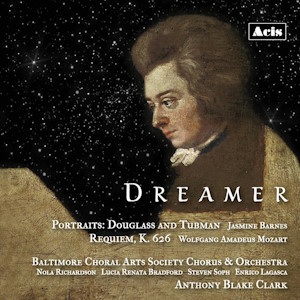
Dreamer
Jasmine Barnes (b. 1991)
Portraits: Douglass & Tubman
Wolfgang Amadeus Mozart (1756-1791)
Requiem (new performance edition by Anthony Blake Clark)
Nola Richardson (soprano), Lucia Renata Bradford (mezzo), Steven Soph (tenor), Enrico Ladasca (bass-baritone)
Baltimore Choral Arts Society Chorus & Orchestra/Anthony Blake Clark
rec. live, 22 May 2022, Kraushaar Auditorium Goucher College, Baltimore, USA
First recordings
Acis APL34825 [61]
This is a live recording (with patch sessions) of a concert that premiered a new work while linking it with an old. The booklet note with the CD outlines some of the thinking behind it, and it makes a lot of sense. Anthony Blake Clark, the conductor of the Baltimore Choral Arts Society Chorus & Orchestra, writes about how he sees Mozart’s as “a young person’s Requiem” – after all, he was only 35 when he wrote it – and he wanted to link its urgency to that of the urgency of those who campaigned for the abolition of slavery in the USA. Both Frederick Douglass and Harriet Tubman were from Maryland, so their words seemed the perfect fit for Maryland composer Jasmine Barnes to set to music in Portraits, alongside some of her own poetry. To complete the picture, the version of Mozart’s Requiem we hear is a new performing edition by Anthony Blake Clark himself, and the whole concert was dedicated “to young black lives that are continually cut short in America”.
At the very least it’s a coherent idea, and if it isn’t always memorable then it certainly comes off in performance. Barnes is a better composer than poet: her texts are pretty bland and don’t add much to her composition. The music she writes for Tubman’s and Douglass’s words is pretty engaging, though. There’s an edgy jazziness to Do Right, while there’s a gentle march-like quality to Moral Growth, both settings of words by Douglass. The two Tubman settings seem more approachably human, on the other hand. Death or Liberty is effectively a pastiche of a spiritual, sung with winsome sway by the chorus, and there’s a schmaltzy, high-sugar quality to Every Great Dream, something that Barnes describes as having a “‘wish upon a star’ kind of feel.” She’s right, and it’s no worse off for that, thought the final syrupy chords were a bit much for me.
Perhaps more people will be interested in the performance of Mozart’s Requiem, which is very good in its way. Anthony Blake Clark’s edition isn’t particularly interventionist, but it’s interesting to hear what he does. There’s some extra instrumental doubling of the voices in part of the Sequenza, for example, and that’s easy to pick up in what is a very nicely balanced recording. It’s weighty and gives the sound an overall richness, and if it favours the choir over the orchestra then the chorus’s separate parts are all very clearly audible. Every so often a rogue instrument sticks out of the orchestral texture: I don’t recall noticing the clarinet (or do I mean basset horn?) line so obviously in the Kyrie before, and the trombone soloist in the Tuba mirum slurs his line so much that you’d think he was playing for a jazz club.
Elsewhere, the winds in Tuba mirum a little distracting when you first hear them, and there’s a surprising swerve in the Lachrymosa, which only lasts a few bars, but adds something distinctive. There’s a little bit of tightening in the Agnus Dei, but otherwise this is recognisably a variant of the familiar Süssmayr version.
Performatively, this is a big-boned approach to this music, but it’s pretty successful in that. The choir sing accurately and very enthusiastically. They go hell-for-leather at the Dies Irae and Confutatis, which is taken at a daringly fast speed, but they’re incisive in the big fugues and there’s a pleasing sense of weight to their singing. It’s a bit surprising that one of the conductor’s influences was John Eliot Gardiner’s recording because his take is much weightier than Gardiner’s, though much of that may be down to the scale of the performers. The quartet of soloists is very strong, too, with a particularly rich, lovely soprano in Nola Richardson and a distinctive mezzo in Lucia Renata Bradford. The slightly reedy tenor of Steven Soph is balanced by an Old Testament Prophet of a bass from Enrico Lagasca.
Realistically, this recording is going to appeal most to Marylanders, particularly those who were at the concert at which this was recorded. There’s enough of interest to tempt a casual listener, though, and it’s a testament to the edition of the Requiem that listening to it is much more fulfilling than a mere game of spot-the-difference.
Simon Thompson
Availability: Acis Productions


















